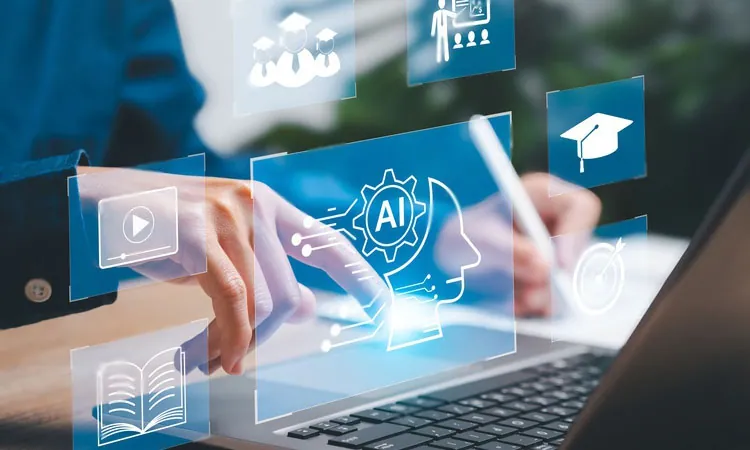Artificial Intelligence (AI) is no longer a futuristic concept. It’s a present reality, permeating various industries and reshaping our lives and work. Understanding the nuances of AI is not just a professional advantage; it’s becoming necessary in today’s evolving job market. This is where AI courses play a pivotal role, offering a spectrum of learning opportunities catering to beginners and seasoned professionals.
The Rise of AI Education
The demand for AI education has surged in recent years. According to a report by Statista, the global artificial intelligence market is expected to reach 267 billion U.S. dollars by 2027, with education being one of the major sectors contributing to this growth. As industries integrate AI into their operations, the need for a skilled workforce familiar with AI principles and applications has become paramount.
Fundamental AI Courses: Laying the Groundwork
Fundamental courses provide the necessary building blocks for those venturing into AI for the first time. These courses typically cover the basics of machine learning, algorithms, and data analysis. Platforms like Coursera, edX, and Khan Academy offer comprehensive courses designed by industry experts and academics.
1. Machine Learning Fundamentals
Understanding machine learning is the cornerstone of AI education. Courses in this category delve into supervised and unsupervised learning, regression, and classification algorithms. They provide hands-on experience implementing machine learning models, laying a solid foundation for more advanced studies.
2. Programming for AI
Proficiency in programming languages is essential for AI development. Python is widely regarded as the language of choice due to its simplicity and versatility. Courses focusing on Python for AI equip learners with the skills to manipulate data, implement algorithms, and create AI applications.
3. Data Science and Analysis
AI relies heavily on data. Courses in data science teach students how to collect, clean, and analyze data effectively. This includes learning tools like Pandas and NumPy, statistical methods, and data visualization techniques.
Intermediate AI Courses: Bridging the Gap
After grasping the fundamentals, intermediate courses bridge the gap between basic understanding and advanced applications. They often involve real-world projects and case studies, providing a practical perspective on AI implementation.
1. Deep Learning
Deep learning is a subset of machine learning focusing on neural networks, attempting to mimic the human brain’s structure and function. Courses in deep learning explore topics like neural network architectures, convolutional neural networks (CNNs), and recurrent neural networks (RNNs). This knowledge is crucial for applications like image recognition and natural language processing.
2. Natural Language Processing (NLP)
NLP is at the forefront of AI applications, powering virtual assistants and language translation services. Courses in NLP teach the intricacies of processing and understanding human language, including sentiment analysis, text summarization, and language generation.
3. Reinforcement Learning
Reinforcement learning involves training algorithms to make decisions by trial and error. This is the foundation for AI systems that can learn and improve over time. Courses in reinforcement learning cover concepts like reward systems, Markov decision processes, and policy optimization.
Advanced AI Courses: Specializing for Impact
As AI matures, specialized knowledge becomes increasingly valuable. Advanced courses allow individuals to focus on specific areas of interest, whether computer vision, robotics, or AI ethics.
1. Computer Vision
Computer vision enables machines to interpret and make decisions based on visual data. Advanced courses in computer vision explore topics like image recognition, object detection, and image segmentation. This knowledge is crucial for applications in autonomous vehicles, healthcare diagnostics, and surveillance systems.
2. Robotics and AI Integration
The synergy between AI and robotics reshapes the manufacturing, healthcare, and logistics industries. Courses in this domain teach how AI algorithms can be integrated into robotic systems, creating intelligent machines capable of complex tasks.
3. AI Ethics and Responsible AI
With great power comes great responsibility. Advanced courses in AI ethics delve into the ethical considerations surrounding AI development and deployment. Topics include bias in AI algorithms, privacy concerns, and the societal impact of AI.
Industry Trends in AI Education
1. Personalized Learning Paths
AI is not just the subject of education; it’s also shaping how education is delivered. Personalized learning paths, driven by AI algorithms, are becoming more prevalent. These paths adapt to individual learning styles and paces, providing a more tailored educational experience.
2. Integration of AI in Course Content
AI is not just a topic of study; it’s a tool for teaching. Many AI courses incorporate AI in their content delivery. For example, AI algorithms may be used to analyze student performance data, providing insights that instructors can use to enhance the learning experience.
3. Hands-on Project-Based Learning
The emphasis on practical, hands-on learning is a notable trend. Many AI courses now incorporate real-world projects, allowing students to apply theoretical knowledge in practical scenarios. This not only enhances understanding but also equips students with valuable project experience.
4. Interdisciplinary AI Education
AI is no longer confined to computer science departments. Interdisciplinary AI courses are emerging, catering to students from diverse backgrounds such as business, healthcare, and humanities. This reflects the growing recognition that AI impacts many industries and professions.
Conclusion: Navigating the AI Learning Landscape
AI courses, ranging from fundamental to advanced, offer a comprehensive journey into artificial intelligence. The evolving landscape of AI education mirrors the dynamic nature of the field itself. As technology advances and industries adopt AI, staying informed and continuously updating one’s skills through relevant courses becomes not just an option but a career imperative. Integrating AI into education is not just about acquiring knowledge; it’s about preparing for a future where AI is not just a tool but an integral part of our professional and personal lives.

